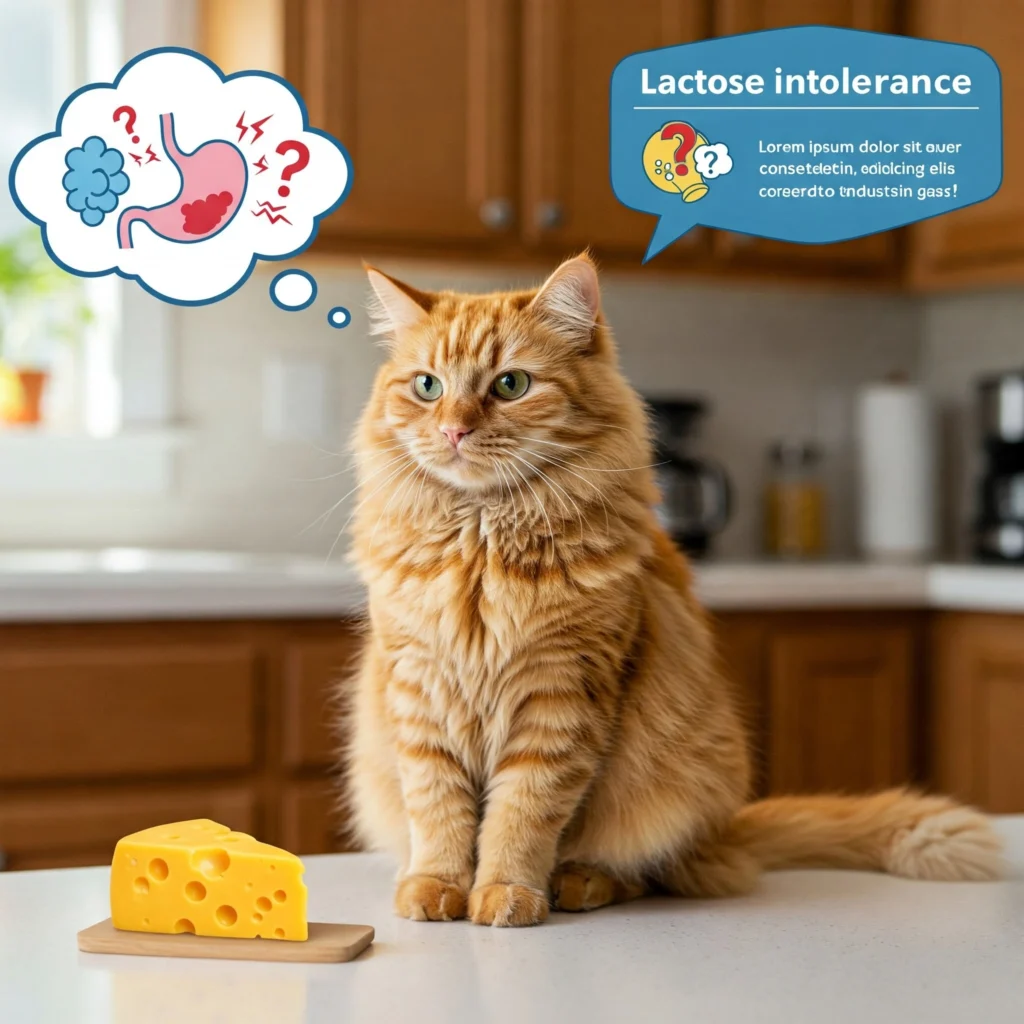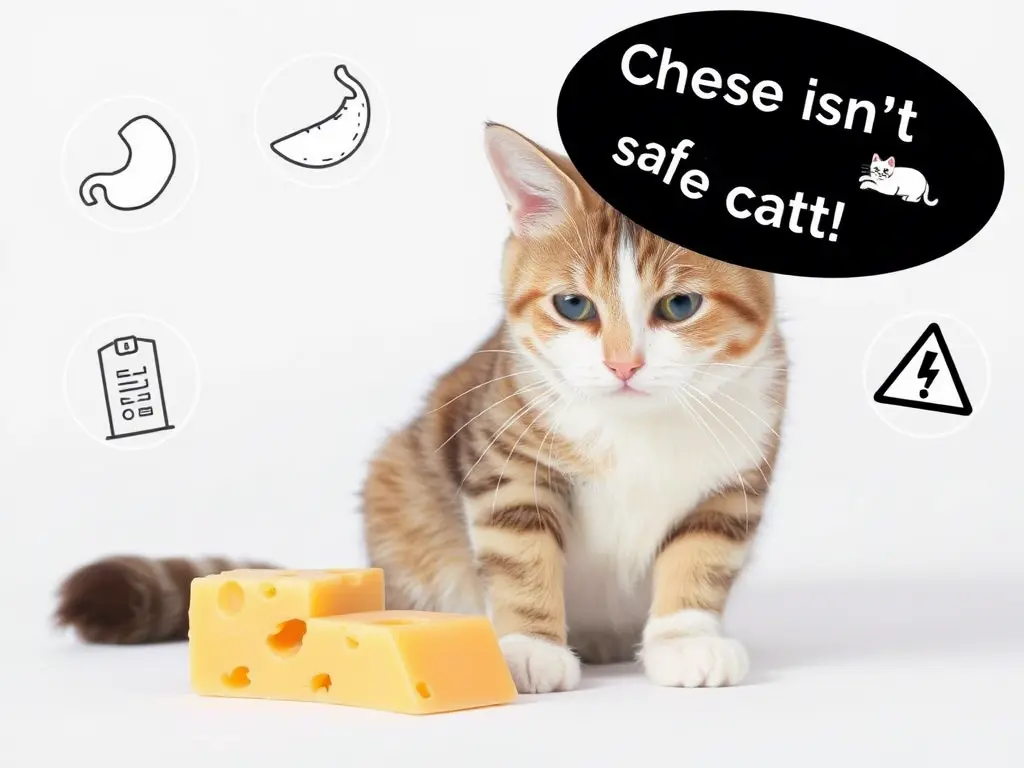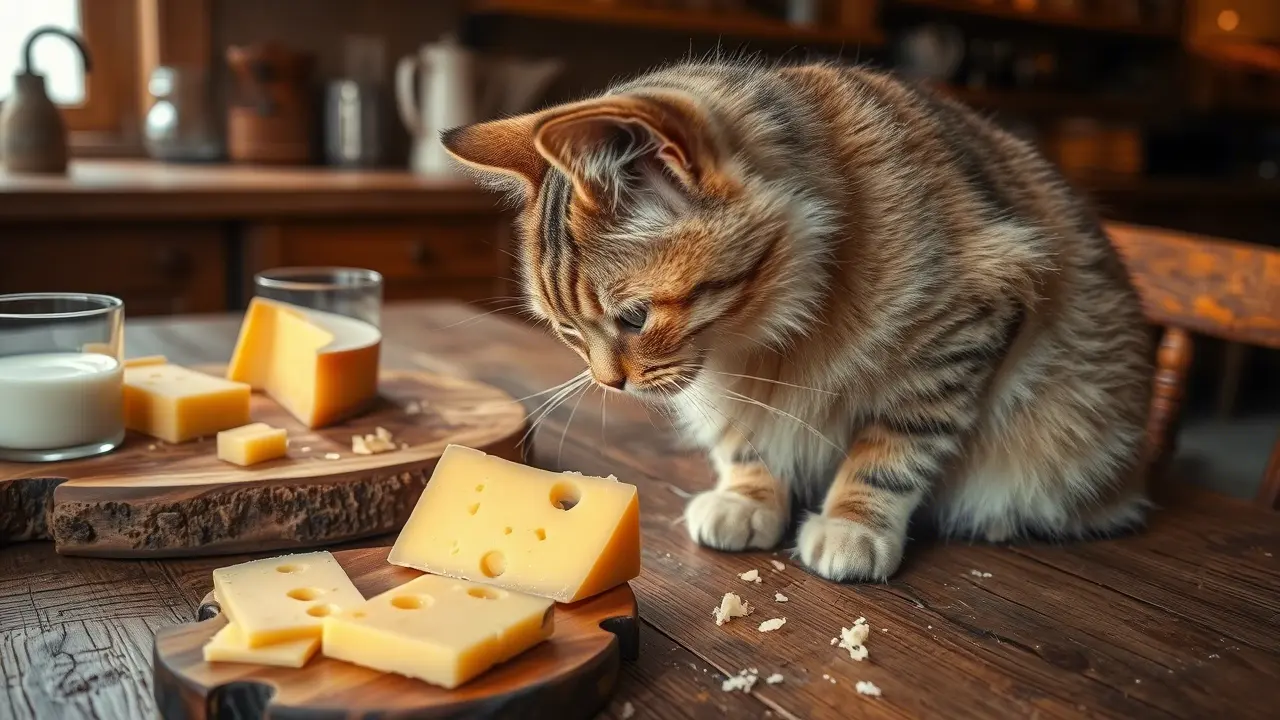Can Cats Eat Cheese? A Feline Guide
“Can Cats Eat Cheese? Cheese and cats—it sounds like a cute combination, right? Somewhere along the way, the idea of cats nibbling on a block of cheese became a popular stereotype. But is cheese really a safe or healthy snack for your feline friend?”
If you’re a cat owner who’s wondered about this, you’re in the right place. This post explores the nutritional value of cheese, why many cats are lactose intolerant, the risks it poses, and whether there are any safe options. We’ll also provide healthier alternatives for treating your cat. Let’s get started!
Table of Contents
The Nutritional Value of Cheese
Cheese is a nutrient-dense food made primarily from milk. Here’s a quick breakdown of its main components and their benefits for humans versus cats:

1. Protein
Cheese is rich in protein, which is essential for building and maintaining muscle. Cats are obligate carnivores, meaning they require protein in their diet. While the protein in cheese may seem compatible with a cat’s nutritional needs, they thrive on animal-based proteins found in meat rather than dairy-based sources.
2. Fat
Cheese contains high levels of fat, which makes it calorie-dense. Cats require some fat for their energy needs, but in excess, it can lead to obesity and other health issues.
3. Calcium
Calcium in cheese helps strengthen bones and teeth in people. While cats also need calcium in their diet, they typically obtain it from cat food, which is carefully formulated to meet their nutritional needs.
While these nutrients may seem beneficial at first glance, the drawbacks of giving cheese to cats far outweigh the positives, especially when considering the next factor—lactose intolerance.
Lactose Intolerance in Cats
Here’s something most feline enthusiasts don’t know—kittens may be able to digest their mother’s milk, but as cats grow older, their ability to digest lactose (the sugar in milk and dairy products) significantly diminishes.
Here’s why:
- “Can Cats Eat Cheese? Like many mammals, cats stop producing lactase, the enzyme needed to break down lactose, once they’re weaned off their mother’s milk.”
- Without adequate amounts of lactase, consuming dairy products like cheese can lead to gastrointestinal upset.

Symptoms of Lactose Intolerance in Cats:
- Diarrhea
- Vomiting
- Gas and bloating
- Abdominal discomfort
According to a recent study, approximately 70% of adult cats exhibit signs of lactose intolerance after consuming dairy. This makes cheese a risky choice for your furry friend.
Expert Tip: Dr. Emily Carter, DVM, explains, “While a tiny nibble of cheese might not harm your cat, it’s generally best to avoid dairy due to the high likelihood of lactose intolerance in felines.”
Risks of Feeding Cheese to Cats
Can Cats Eat Cheese? Cheese isn’t just a potential digestive hazard for cats; other dangers lurk as well.

1. Digestive Upset
For lactose-intolerant cats, even small amounts of cheese can result in diarrhea, vomiting, and abdominal pain.
2. Obesity
Cheese is calorie-packed. Regularly offering it as a treat can contribute to weight gain. Dr. James Oliver, Veterinary Nutritionist, warns, “Cheese is calorie-dense and can quickly contribute to weight gain in cats. Opt for healthier treat options that support their nutritional needs.”
3. Allergic Reactions
Some cats may develop allergies to dairy, resulting in itchiness, excessive grooming, or respiratory issues.
4. Choking Hazard
Certain types of hard cheese can pose a choking risk, especially for small cats.
A Real-Life Case Study: Claire, a devoted cat owner, shared a story about her cat, Mittens, who often begged for cheese. “I gave him a little slice once, and hours later, he had terrible diarrhea. Never again—it’s not worth the cleanup or harming my little guy’s tummy.”
Are Any Cheeses Safe for Cats?
Can Cats Eat Cheese? If your cat absolutely loves cheese and you’re determined to indulge them occasionally, moderation is key. Here are some cheeses that are somewhat safer due to their lower lactose content:
- Swiss cheese: Naturally low in lactose, making it easier to digest in very small quantities.
- Mozzarella: Soft and low-lactose, but still, portion control is critical.
- Cheddar: Aged cheeses like cheddar contain less lactose than fresh varieties.
Even with these options, offer cheese as a rare treat, the size of a pea or smaller, and observe your cat for any adverse reactions.
Dr. Sarah Matthews, Feline Specialist, advises, “If you must give your cat cheese, choose low-lactose varieties like Swiss or mozzarella and offer it very sparingly.”
Healthy Alternatives to Cheese
Why risk health issues when there are plenty of safe, cat-approved treats? Consider these healthier options instead:
1. Store-Bought Cat Treats
- Designed to meet cats’ nutritional needs.
- Available in a variety of flavors, including chicken, fish, and beef.
2. Cooked Meat
- Small pieces of plain, cooked chicken, turkey, or fish can be a protein-packed treat.
- Avoid seasoning, oils, or sauces.
3. Catnip or Cat Grass
- A fun and healthy reward for cats who respond to these plants.
4. Freeze-Dried Treats
- High in protein and available in single-ingredient options like salmon or chicken.
Many cats will enjoy these alternatives more than cheese and without any of the risks!
What Do the Experts Say?
Veterinarians and pet nutritionists emphasize the importance of moderation and caution.
- Dr. Emily Carter, DVM: “Cheese is generally unnecessary in a cat’s diet and can lead to avoidable health issues. Stick to treats specifically made for felines.”
- Dr. James Oliver, Veterinary Nutritionist: “Skip the cheese altogether and focus on nutrient-rich alternatives that support your cat’s overall health.”
- Veterinary Study Highlight: “It’s estimated that of all adult cats, 70% exhibit varying levels of lactose intolerance symptoms after consuming dairy.”
Their advice is clear—when it comes to feeding cheese to your cat, less is more.
Final Thoughts on Cats and Cheese
Can Cats Eat Cheese? For most cats, cheese is more of a temptation than a suitable treat. The risk of digestive upset, obesity, or allergic reactions far outweighs the temporary enjoyment they might derive from a nibble.
If you do decide to share cheese with your cat, stick to very small amounts of low-lactose varieties and only on rare occasions. Opting for healthier, cat-friendly treats is always the better choice.
Your furry companion depends on you to make the best decisions for their health and happiness—so, why not spoil them with treats designed just for them?
For more tips on feline nutrition, check out these resources from trusted organizations like the American Animal Hospital Association, ASPCA, and Cornell University College of Veterinary Medicine.
Love your cat, but ditch the cheese. Trust us—they’ll purr out of gratitude.
Frequently Asked Questions (FAQ)
Q: Can cats have any dairy products at all?
A: While most cats are lactose intolerant and should avoid traditional dairy like milk or cheese, there are lactose-free options specifically formulated for cats that may be safe in moderation. Always consult your veterinarian before introducing new foods.
Q: Why do cats seem to enjoy milk if it’s not good for them?
A: Cats are naturally drawn to the creamy texture and fat content in milk, but their digestive systems aren’t equipped to handle lactose, leading to potential discomfort or health issues.
Q: What are some safe treats I can give my cat instead of cheese?
A: Cats enjoy protein-rich treats like cooked chicken, turkey, or specially made cat treats available at pet stores. Always ensure treats are free of harmful additives or seasonings.
Q: How can I tell if my cat is lactose intolerant?
A: Signs of lactose intolerance in cats include vomiting, diarrhea, or an upset stomach after consuming dairy. If you notice these symptoms, avoid dairy and consult your vet.







